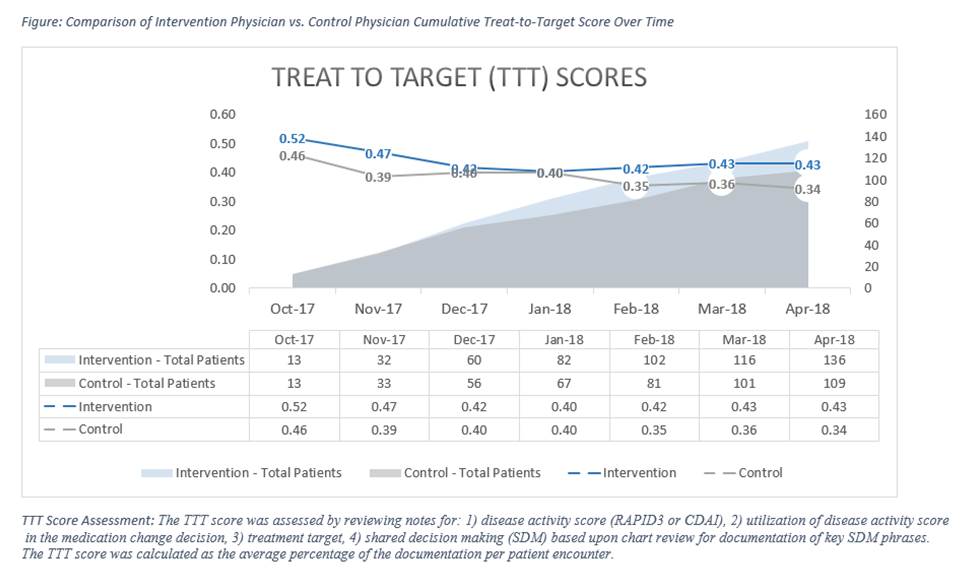Session Information
Session Type: ACR Poster Session A
Session Time: 9:00AM-11:00AM
Background/Purpose: Changing clinical practice patterns and incorporation patient-reported outcome measures (PROMs) for disease activity assessment into routine workflow is challenging. We sought to integrate a treat-to-target (TTT) approach for medication optimization for patients with RA in our practice through: 1) a reliable system to collect disease activity scores (PROMs) using iPads in the waiting room, 2) a multidisciplinary learning collaborative (LC) for providers focused on TTT, and 3) incorporation of patient perspectives on shared decision making (SDM) and treatment satisfaction.
Methods: At an academic medical center rheumatology clinic, patients completed a Routine Assessment of Patient Index Data 3 (RAPID3) survey via an online patient portal or an iPad. RAPID3 scores were uploaded to patient charts and were available for physicians to review during the visit. Rheumatologists were non-randomly allocated to either intervention (N=8) or control (N=13) groups. Intervention physicians attended monthly LC sessions between August 2017-June 2018 to discuss and develop TTT practices to use during visits with RA patients. Physician visit notes were retrospectively examined by 2 researchers to identify patients with medication changes and to calculate a “TTT score”. Mean TTT scores between intervention and control rheumatologists were evaluated using T-test. Phone calls were made to patients of physicians in the intervention group following a medication change to measure treatment satisfaction using the Treatment Satisfaction Questionnaire for Medication (TSQM) and use of SDM through the 9-item Shared Decision Making Questionnaire (SDM-Q-9). The TSQM and SDM-Q-9 questionnaires are both on 100 point scales and higher numbers reflect positive scores.
Results: From May 2017-April 2018, 2656 RA patients completed RAPID3 surveys with an average completion rate of 70%. Mean TTT scores among the intervention group rheumatologists were 9% higher than those in the control group (43% vs. 34%, p= 0.0042) (Figure). 72 phone calls were completed to patients of rheumatologists in the intervention group with median[IQR] TSQM score components of 75[58, 92] (effectiveness), 92[83, 100] (side effects), 100[89, 100] (convenience), and 83 [67, 100] (global satisfaction), and median[IQR] SDM-Q-9 score of 96[87, 00].
Conclusion: The results of this non-randomized, quality improvement study show feasibility and utility of electronic PROMs collection methods and real-time integration of PROMs survey scores into the electronic medical record. It also demonstrates the ability of a learning collaborative model to impact TTT practices within a large academic medical practice, as the non-randomized fashion mimics “real-world” experience.
To cite this abstract in AMA style:
Forman M, Leatherwood C, Xu C, Ko E, Lu B, Iversen MD, Solomon D, Desai S. Implementation of a Treat-to-Target Quality Improvement Program for Rheumatoid Arthritis Management Using Real-Time Patient Reported Outcome Measures [abstract]. Arthritis Rheumatol. 2018; 70 (suppl 9). https://acrabstracts.org/abstract/implementation-of-a-treat-to-target-quality-improvement-program-for-rheumatoid-arthritis-management-using-real-time-patient-reported-outcome-measures/. Accessed .« Back to 2018 ACR/ARHP Annual Meeting
ACR Meeting Abstracts - https://acrabstracts.org/abstract/implementation-of-a-treat-to-target-quality-improvement-program-for-rheumatoid-arthritis-management-using-real-time-patient-reported-outcome-measures/

